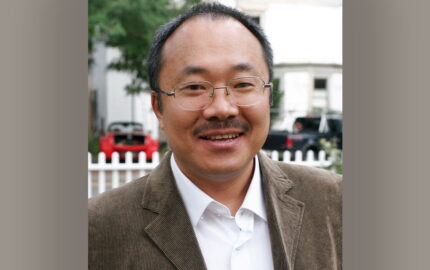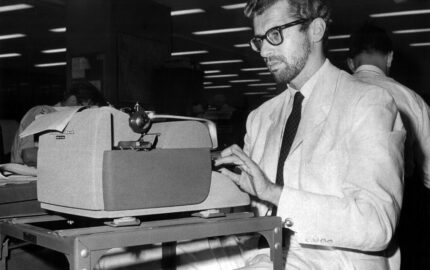CAMBRIDGE, Mass. (April 18, 2002) — An article by Les Gura of the Hartford Courant about an instructor at Yale University, who became the focus of stories that unfairly cast him as a murder suspect, is the inaugural winner of the Taylor Family Award for Fairness in Newspapers. The award, endowed by the former publisher of The Boston Globe and the Taylor family, carries a $10,000 prize.
Gura's story examined how the news media covered the story and how the community reacted to that coverage. His article exemplified what the judges described as raising reader awareness "in a way that was fair to the suspect and to the system of justice."
The Taylor Award judges also recognized three finalists:
The winner and finalists will be recognized at a dinner and panel discussion on April 25 at the Harvard Faculty Club in Cambridge.
The Taylor Family Award for Fairness in Newspapers was established through gifts for an endowment by members of the Taylor family, which published The Boston Globe from 1872 to 1999. The purpose of the award is to encourage fairness in news coverage by America's daily newspapers.
The judges made particular note of Gura's examination of his own newspaper's standards in its initial coverage of the crime, including stories on James Van de Velde, a Yale University instructor, whose name was leaked to the press as one in a pool of suspects being questioned in the murder of Yale senior Suzanne Jovin in December 1998.
Local and national news outlets focused coverage on Van de Velde, quoting police and anonymous sources that built him into a suspect. He was never arrested, police never produced evidence linking him to the crime and no one has been charged with the crime. Once considered a promising young instructor at Yale, his career is now in tatters. The university cancelled his classes and then refused to renew his teaching contract.
Gura's story, published in the newspaper's Northeast magazine, concluded that basic standards of fairness on the part of law enforcement, Yale University and the news media had been abandoned in the rush to cover the drama of a coed/teacher scandal.
John Haile, former editor of the Orlando Sentinel, who nominated the article, said, "This is a newspaper's effort to balance the scales of justice until the judicial process can run its course." It provides a public hearing for someone who, for the most part, had been denied the "benefit of the doubt. The scales of justice don't need additional weight on one side or the other. Fairness must be available to all parties."
William O. Taylor, chairman emeritus of the Globe, embraced the idea of an award for fairness in newspapers as a way to give something back to the craft in which five generations of his family devoted their working lives. The Taylor family 127-year stewardship of the Globe was characterized by an enduring commitment to fairness. At his invitation the Nieman Foundation for Journalism at Harvard agreed to administer the prize.
Nominations for the Taylor Fairness Award were submitted by a panel of nominators.
The judges for the Taylor Fairness Award are: Bill Kovach, chairman of the Committee of Concerned Journalists and former Nieman curator; Bob Haiman, President Emeritus of the Poynter Institute, and Freedom Forum Fellow, the Freedom Forum; Michael Getler, ombudsman for The Washington Post; and Martha Minow, a professor at Harvard Law School who is on the faculty at the Center for Ethics and the Professions. Current Nieman curator Bob Giles is the chair of the jury.
Gura's story examined how the news media covered the story and how the community reacted to that coverage. His article exemplified what the judges described as raising reader awareness "in a way that was fair to the suspect and to the system of justice."
The Taylor Award judges also recognized three finalists:
- The Baltimore Sun for a story explaining the police and judicial process that resulted in a jury acquittal of a Baltimore teen-ager accused of killing a police officer. The case had been considered an open-and-shut case of cop killing and the jury verdict produced community outrage.
- The Chicago Tribune for a series examining how Chicago police obtained false confessions from African-American young men with criminal records.
- The New Orleans Times-Picayune for a series that looked closely at New Orleans' affirmative action programs and discovered that many well-connected minority-owned firms benefited from the program, while others with greater needs did not.
The winner and finalists will be recognized at a dinner and panel discussion on April 25 at the Harvard Faculty Club in Cambridge.
The Taylor Family Award for Fairness in Newspapers was established through gifts for an endowment by members of the Taylor family, which published The Boston Globe from 1872 to 1999. The purpose of the award is to encourage fairness in news coverage by America's daily newspapers.
The judges made particular note of Gura's examination of his own newspaper's standards in its initial coverage of the crime, including stories on James Van de Velde, a Yale University instructor, whose name was leaked to the press as one in a pool of suspects being questioned in the murder of Yale senior Suzanne Jovin in December 1998.
Local and national news outlets focused coverage on Van de Velde, quoting police and anonymous sources that built him into a suspect. He was never arrested, police never produced evidence linking him to the crime and no one has been charged with the crime. Once considered a promising young instructor at Yale, his career is now in tatters. The university cancelled his classes and then refused to renew his teaching contract.
Gura's story, published in the newspaper's Northeast magazine, concluded that basic standards of fairness on the part of law enforcement, Yale University and the news media had been abandoned in the rush to cover the drama of a coed/teacher scandal.
John Haile, former editor of the Orlando Sentinel, who nominated the article, said, "This is a newspaper's effort to balance the scales of justice until the judicial process can run its course." It provides a public hearing for someone who, for the most part, had been denied the "benefit of the doubt. The scales of justice don't need additional weight on one side or the other. Fairness must be available to all parties."
William O. Taylor, chairman emeritus of the Globe, embraced the idea of an award for fairness in newspapers as a way to give something back to the craft in which five generations of his family devoted their working lives. The Taylor family 127-year stewardship of the Globe was characterized by an enduring commitment to fairness. At his invitation the Nieman Foundation for Journalism at Harvard agreed to administer the prize.
Nominations for the Taylor Fairness Award were submitted by a panel of nominators.
The judges for the Taylor Fairness Award are: Bill Kovach, chairman of the Committee of Concerned Journalists and former Nieman curator; Bob Haiman, President Emeritus of the Poynter Institute, and Freedom Forum Fellow, the Freedom Forum; Michael Getler, ombudsman for The Washington Post; and Martha Minow, a professor at Harvard Law School who is on the faculty at the Center for Ethics and the Professions. Current Nieman curator Bob Giles is the chair of the jury.


